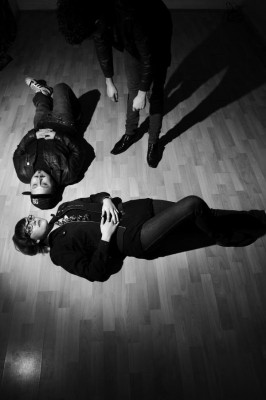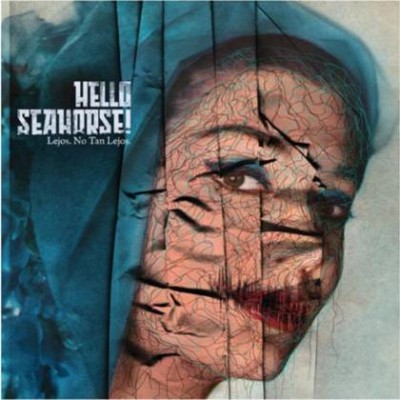Hello Seahorse! and their ópera prima

You might expect a band with a name as whimsical as Hello Seahorse! to make light-hearted, twee-leaning music about sea creatures romping and frolicking (if you can do that under water, that is) and being generally too cute for words. But the Mexican indie pop band defies their moniker and produces some of the country’s most inspired and compelling music. Last year’s Bestia was considered by many to be one of the year’s best Latin American albums and earned the band several awards and nominations, including a Latin Grammy nomination for the album’s title track. They are nominated again this year for “Criminal” and recently released the ambitious Lejos. No tan lejos. in Mexico (US release via Nacional Records on January 25th). We talked to lead singer Lo Blondo about the new album, opera, and the Grammys.
_____________________________________________________________
How is the album different from the last, and how has your sound changed?
It’s very different, but still very natural. We were in a very different place recording this album than we were in with Bestia. With Joe, we reintroduced the guitar sound to our aesthetic. We also added an organ. When we were on our way to record the album, we went to pick up Oro de Neta and I said to him, “Hey, remember that organ that you have that your aunt gave to you? Bring it!” And that organ was very important for the texture of the new album and it became part of the live show, too.
You’ve gotten a lot of attention from American media, like Pitchfork and Stereogum. What about your music do you think appeals to an American audience and to an international audience?
I think all music can be international. Language isn’t important. Of course, the words are very important, but the music itself is the most important. We played in California recently, and this guy came up to me and asked if I spoke English. Then he told me, “I love your music. I don’t know what you’re saying, but I just felt it so near to me.” Music on its own is beautiful and communicates and transforms. And all music can be like that if you open your heart and let it enter and touch the most sensitive fibers that you have within.

You’re nominated for the Best Alternative Song Grammy again this year for “Criminal.” Congratulations.
Thank you so much!
How does it feel to have your work recognized like that?
It was a surprise because we had already been nominated last year with “Bestia.” And for it to happen again this year is crazy. We’re very happy. And this year we’re going to actually be able to attend, which is exciting.
Very exciting. I know “alternative song” is a bit of an ambiguous category, but what would you say is the best alternative song of the year?
That’s a really hard question. “Arena” by Chetes is a great song.
What are you working on right now and what’s next?
Right now we’re just playing here in Mexico City. We recorded “Hasta Morir” for a Caifanes tribute album that was just released. For next year we’re planning a lot of exciting things that I can’t really divulge right now. All I can say is that it involves a great Mexican band.
_____________________________________________________________
Check out below the Latin Grammy nominated “Criminal” video off Hello Seahorse!’s previous album Bestia. Lejos. No tan lejos. debuts stateside on January 25th.
 So, tell me about Lejos. No tan lejos. Why did you decide to work on a new album so soon after Bestia, and how was the process of writing and recording?
So, tell me about Lejos. No tan lejos. Why did you decide to work on a new album so soon after Bestia, and how was the process of writing and recording?
 Your voice has always been such an important part of the music, an instrument in its own right. On Lejos. No tan lejos you seem to be exploring the ranges of your voice more. Is that something that you did consciously or did it just happen naturally as you were working on the album?
Your voice has always been such an important part of the music, an instrument in its own right. On Lejos. No tan lejos you seem to be exploring the ranges of your voice more. Is that something that you did consciously or did it just happen naturally as you were working on the album?